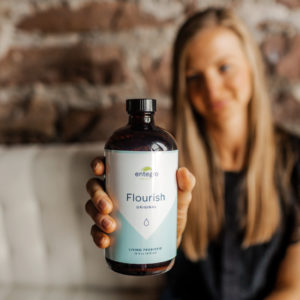Alcohol Use and Gut Health: A Crossroads
Have you ever wondered how alcohol use affects your gut health? As summertime approaches, kicking back on the deck with an ice-cold cocktail sound like a great way to end the day. Is a small amount of alcohol better than a large amount of alcohol?
How does alcohol use affect the gut and the bacteria who live there?
Let’s take a look at how the body metabolizes alcohol to better understand the systemic effects. When we drink socially (defined as two standard drinks), the alcohol is primarily absorbed in our upper intestinal tract through diffusion. Once in the bloodstream, alcohol makes its way to the liver, the primary organ in charge of cleaning up alcohol. 
First, the alcohol dehydrogenase system occurs. This metabolic process removes 80-90% of the alcohol from your body through the liver. Hepatocytes are the liver cells that degrade alcohol into acetaldehyde using a specialized enzyme. However, acetaldehyde is extremely toxic to your body, especially to the liver. Fortunately, with the help of more enzymes, this toxic byproduct breaks down into acetate, a non-toxic molecule. Then, our bodies can use acetate for energy elsewhere.
When we consume a significant or excessive amount of alcohol, our body needs additional help. Enter the microsomal ethanol-oxidizing system (MEOS.) The MEOS system is the second metabolic process for getting rid of circulating ethanol, but it has a few adverse side effects. One critical effect is the production of free radicals, which can cause cellular damage throughout the body. This process occurs primarily in liver cells but also occurs in the intestinal mucosa. Much like the dehydrogenase system, the main end product is acetate.
Now that we know both processes degrade alcohol into acetate, what happens next?
Acetate releases into circulation or stays in the liver where it converts to acetyl CoA. Then, the liver uses acetyl CoA to create fatty acids and cholesterol. Even though acetate is a non-toxic molecule, having too much of its liver byproduct often causes issues. Retaining excess Acetyl CoA can contribute to fatty liver disease.
So, what does this have to do with the gut and bacteria?
Yes, some of the MEOS process occurs in your intestinal mucosa, which is an important part of the intestinal wall and is the barrier between the inside and the outside of your body. While one drink a day is likely manageable, the most harmful damage occurs with chronic alcohol consumption. In turn, this excess consumption leads to chronic disruption of your gut barrier and chronic inflammation. It even changes the bacteria that choose to live in your gut. Furthermore, the tight junctions between the cells of the epithelial layer become leaky. This allows the passage of large molecules that belong within your gut to travel into your bloodstream.
How does alcohol use affect your gut health? Studies show alcohol promotes dysbiosis and bacterial overgrowth of the types of bacteria that produce endotoxins as a metabolite. So, it’s really a double whammy: alcohol removes the helpful metabolites produced by beneficial bacteria and replaces them with bacteria that produce harmful byproducts. 
Life Application
Knowing chronic and/or excessive consumption of alcohol is detrimental to gut health, what are the alcohol drinking parameters to follow for optimal gut health?
Generally speaking, a drink or two several times a week is okay for gut health. Especially for those who have a history of good gut health. For those of us who may be struggling with a gut issue, removing alcohol from the diet is a great place to start. One detrimental side effect of alcohol is dehydration. Adding an additional hydrating beverage for every dehydrating alcoholic beverage is a good rule to follow. Perhaps consider adding a good-sized splash of sparkling water to wine and mixed drinks to make them a spritzer. Diluting your drink makes it last longer and combats the diuretic effects of alcohol.
Adding a high-quality probiotic to your daily routine is a great way to reintroduce the beneficial bacteria that produce the metabolites your body needs. Flourish includes eleven strains of probiotics from five different families, all living in their most natural environment that they create for themselves.
Sources
Bishehsari, F., Magno, E., Swanson, G., Desai, V., Voigt, R. M., Forsyth, C. B., & Keshavarzian, A. (2017). Alcohol and Gut-Derived Inflammation. Alcohol research : current reviews, 38(2), 163–171.
https://ecampusontario.pressbooks.pub/humannutrition/chapter/alcohol-metabolism/

 New customers! Get 11% OFF your first Flourish order with Code FRESHSTART11
New customers! Get 11% OFF your first Flourish order with Code FRESHSTART11